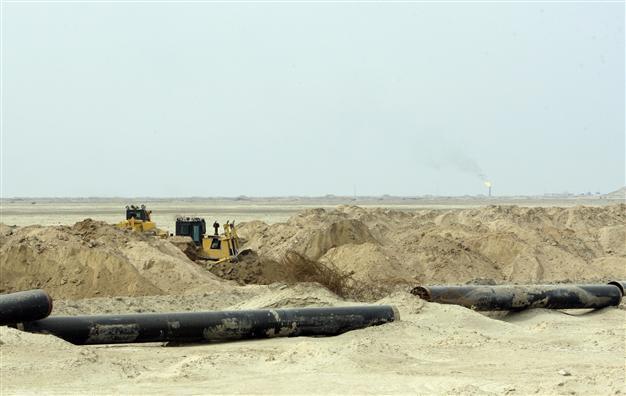IEA says Iraq oil supplies not at risk if fighting contained
PARIS - Agence France-Presse

A file picture taken on February 7, 2012 shows pipes being put in place as the land is cleared from mines laid down during the Iraq-Iran war 1980-1988, in the massive Majnoon oil field. AFP Photo
A lightning advance by jihadists across northern Iraq has rekindled concern on oil markets, but the IEA cautioned June 13 that supplies from leading exporter Iraq may not be at immediate risk.
In the past week militants have swept across northern Iraq and were closing in on the capital Baghdad, sparking fears that OPEC's number two producer could be hit and sending oil prices to their highest levels of the year.
"Concerning as the latest events in Iraq may be, they might not for now, if the conflict does not spread further, put additional Iraqi oil supplies immediately at risk," the Paris-based International Energy Agency said on a cautionary note in its monthly oil market report.
It pointed out that Iraq's relatively small output from the north of the country has been off the market since March due to violence while output from the south has been on the rise and production has hit a 30-year high. However the IEA, the energy monitoring and policy arm of the OECD group of advanced nations, pointed to the long-term importance of Iraq for the global energy market.
It calculated that "roughly 60 percent of the growth in OPEC crude production capacity for the rest of this decade will come from Iraq."
The 12-nation oil cartel, which supplies one third of the world's crude, earlier this week decided to hold their collective production target at 30 million barrels per day (bpd), where it has stood since late 2011, as they said the oil market was stable. Oil producing nations have expressed their satisfaction with oil prices slightly above $100 a barrel - where they have been for most of this year - as it brings them in sufficient revenue while not crimping growth in consuming nations.
But oil prices rose to nine-month highs in Asian trading on June 13 as militants closed in on Iraq's capital Baghdad, with Brent North Sea crude gaining 28 cents to $113.30 per barrel after shooting up $3.07 in London trade on June 12. U.S. benchmark West Texas Intermediate advanced 47 cents to $107.00 in afternoon trade after surging $2.13 in New York on Thursday to reach its highest level since September.
The IEA put Iraq's daily oil production in May at 3.37 million barrels per day, up from 3.32 mbd in April.
That put it behind Saudia Arabia at 9.75 mbd, and which has spare capacity estimated at 3.31 mbd which could be used to calm markets in case supplies are cut off elsewhere. OPEC-member Libya has been rocked by violence that has slashed the North African nation's output to less than 100,000 barrels per day in early June according to the IEA, down from output of 1.4 mbd one year ago.
Overall OPEC supplies edged up to 29.99 mbd in May. The IEA also noted that the stability in oil markets has been due to record gains in non-OPEC output.
"Perception of heightened political risk in North Africa and the Middle East and chronic disruptions in Libyan exports have been a feature of the market for some time, but so far have been largely offset by record growth in non-OPEC supply," it said.
The IEA said global supplies rose by 530,000 barrels per day in May, to 92.6 mbd, mostly due to increases in non-OPEC output. It kept its global oil demand forecast at a rise of 1.3 mbd in 2014 to 92.8 mbd
